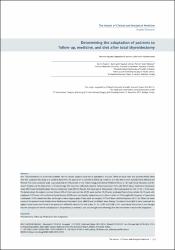| dc.contributor.author | Sayılan, Samet | |
| dc.contributor.author | Sayılan, Aylin Aydın | |
| dc.contributor.author | Temiz, Zeynep | |
| dc.contributor.author | Aközcan, Serpil | |
| dc.date.accessioned | 2021-12-12T17:02:30Z | |
| dc.date.available | 2021-12-12T17:02:30Z | |
| dc.date.issued | 2019 | |
| dc.identifier.issn | 2667-663X | |
| dc.identifier.uri | https://doi.org/10.4328/ACAM.6041 | |
| dc.identifier.uri | https://hdl.handle.net/20.500.11857/3476 | |
| dc.description.abstract | Aim: Thyroid nodules are a common condition. For this reason, surgeons have lots of operation in this area. There are basic rules that patients should follow after this surgery. In this study, It is aimed to determine the adaptation of patients to follow-up, medicine, and diet after a total thyroidectomy. Material and Method: This cross-sectional study was conducted on 108 patients in the Endocrinology and internal Medicine Clinics at Dr. Sadi Konuk Education and Research Hospital and the Department of Endocrinology. The data were collected using the Patient Assessment Form, the Beliefs About Medication Compliance Scale (BMCS) and the Beliefs about Dietary Compliance Scale (BDCS). Results: The mean age of the patients in the study sample (n=108) 47.03 +/- 10.55 years. The details about the subjects were as follows:50% of them were women, 88.9% were married, 35.2% were graduated from primary school, 36.1% were self-employed, 41.7% were informed about thyroid disease. 34.3% were examined by a physician once in three months, 41.7% thought this frequency of inspections is adequate, 70.4% stated that they will accept to have surgery again if they need any surgery, 41.7% of them used levothyroxine (0.5-1 tb). When the mean scores of the patients in the Beliefs About Medication Compliance Scale (BMCS) and the Beliefs about Dietary Compliance Scale (BDCS) were examined, the highest mean scores were found in the perception of benefit subscale for both scales, 21.14 +/- 2.87 and 23.38 +/- 3.34, respectively. Discussion: It was thought that the perception of benefit and adaptation are positively correlated, it was also thought that informing after the intervention improves the adaptation. | en_US |
| dc.language.iso | eng | en_US |
| dc.publisher | Bayrakol Medical Publisher | en_US |
| dc.relation.ispartof | Annals of Clinical and Analytical Medicine | en_US |
| dc.identifier.doi | 10.4328/ACAM.6041 | |
| dc.rights | info:eu-repo/semantics/openAccess | en_US |
| dc.subject | Thyroidectomy | en_US |
| dc.subject | Follow-up | en_US |
| dc.subject | Medication | en_US |
| dc.subject | Diet | en_US |
| dc.subject | Adaptation | en_US |
| dc.title | Determining the adaptation of patients to follow-up, medicine, and diet after total thyroidectomy | en_US |
| dc.type | article | |
| dc.department | Fakülteler, Sağlık Bilimleri Fakültesi, Hemşirelik Bölümü | |
| dc.identifier.volume | 10 | en_US |
| dc.identifier.startpage | 572 | en_US |
| dc.identifier.issue | 5 | en_US |
| dc.identifier.endpage | 575 | en_US |
| dc.relation.publicationcategory | Makale - Uluslararası Hakemli Dergi - Kurum Öğretim Elemanı | en_US |
| dc.identifier.wos | WOS:000512905300012 | en_US |



















